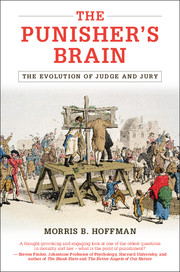Book contents
- Frontmatter
- Contents
- Acknowledgments
- Introduction
- 1 The Most Original of Original Sins
- 2 Detecting and Blaming
- 3 First-Party Punishment: Conscience and Guilt
- 4 Second-Party Punishment: Retaliation and Revenge
- 5 Third-Party Punishment: Retribution
- 6 Forgiveness and Its Signals
- 7 Delegating Punishment
- 8 Legal Dissonances
- 9 Evaluating Some Process Dissonances
- 10 Into the Gap: Evaluating Some Substantive Dissonances
- 11 Brains Punishing Brains
- Index
- References
5 - Third-Party Punishment: Retribution
Published online by Cambridge University Press: 05 May 2014
- Frontmatter
- Contents
- Acknowledgments
- Introduction
- 1 The Most Original of Original Sins
- 2 Detecting and Blaming
- 3 First-Party Punishment: Conscience and Guilt
- 4 Second-Party Punishment: Retaliation and Revenge
- 5 Third-Party Punishment: Retribution
- 6 Forgiveness and Its Signals
- 7 Delegating Punishment
- 8 Legal Dissonances
- 9 Evaluating Some Process Dissonances
- 10 Into the Gap: Evaluating Some Substantive Dissonances
- 11 Brains Punishing Brains
- Index
- References
Summary
God will punish the wicked. And before He does, we will.
John GreenThe Punishing Animal
Ask anthropologists to list the things that make us most human – those special triggers of the human spark – and among the usual fare of language, consciousness, and of course the big social brains that make language and consciousness possible, will be an unlikely candidate: third-party punishment. We seem to be the only animal on Earth with a strong urge to punish wrongdoers when their wrongs cause harm to others but not to us.
Let’s go back to that bus stop (or cattle crossing or town square) from the previous chapter, and instead of us getting pushed and knocked over by the wrongdoer, let’s imagine that he pushes another innocent bystander. Through the miracle of empathy, remarkably similar feelings of fight or flight well up inside us, although admittedly not as sharp as when we are the victim. We get that same gnarl in our stomach, that same anxiousness about intervening, that same flash from our amygdalas telling us we are at risk, that same little dash of disgust from our insulas telling us this kind of aggression is intolerable. Just like when we are the victim, those instincts compete against a myriad of other inputs to produce a behavior.We might walk away, we might intervene, or we might pretend we don’t see anything. But an unavoidable part of our decision is the urge we instantly feel to punish the wrongdoer, even though we are not at risk of being injured by him.
- Type
- Chapter
- Information
- The Punisher's BrainThe Evolution of Judge and Jury, pp. 150 - 187Publisher: Cambridge University PressPrint publication year: 2014



